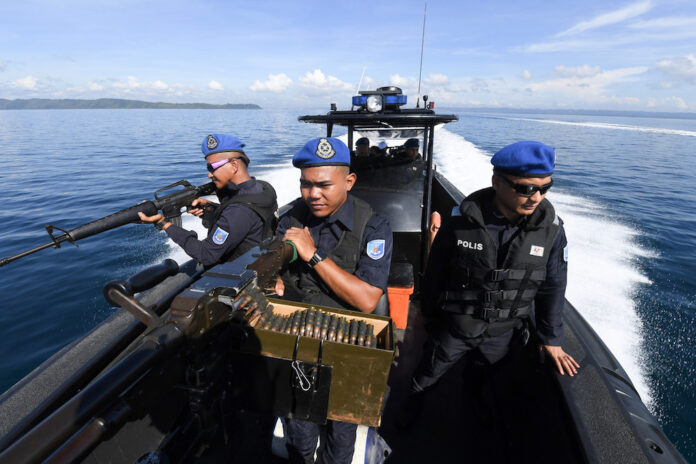The source said that intelligence gathering and security have been stepped up in Sabah since the discovery of the Sulu meeting. — Bernama pic
KOTA KINABALU, Dec 9 — The Southern Philippines officials and the Sulu militia were making secret plans to invade Sabah, according to a regional security who said this could take place next February, nine years after a deadly incursion into Lahad Datu.
According to a report by South China Morning Post‘s “This Week in Asia” section, the source claimed 19 locally elected mayors from the Sulu Archipelago met on December 1 to discuss plans on sending a “Royal Sulu Army” of 600 men to invade Sabah.
Quoting the source, the report said that the meeting was arranged by a senior local government official in the southern Philippines.
“The potential of the plan to attack Sabah coming to fruition depends on how much political support and funds it can get from various parties,” the report quoted the source as saying.
“Many stakeholders in the Philippines and abroad are willing to exploit this issue for their respective political and strategic interests.”
This time, the source said some 150 to 200 spies from Sulu were expected to be directed to Lahad Datu and Semporna — two key coastal towns where an invasion force might land and the firearms to be used by the soldiers will be buried in an area before.
He said that sleeper cells were in Sabah, while intelligence gathering and security have been stepped up in Sabah since the discovery of the Sulu meeting.
The plan comes nine years after the last Sulu Sultanate’s bid to “take back” the North Borneo territory after long standing sovereignty issues have failed to move forwards.
“The failure of the heirs of the Sulu Sultanate to obtain the consent of the Malaysian government to settle the proprietary rights over Sabah prompted the implementation of this plan,” said the source.
In February 2013, over 200 self-styled armed Sulu military invaded the east coast town of Lahad Datu at the behest of self-proclaimed Sultan of Sulu, Jamalul Kiram III, and led by the Jamalul’s brother, Agbimuddin, whose family was seeking an ancestral claim over Sabah.
The Sultanate of Sulu used to rule over parts of the southern Philippines and Sabah, before the British government transferred Sabah to the Federation of Malaysia in 1963.
The conflict, which lasted more than a month, resulted in the deaths of 68 men from the Sulu sultanate, nine Malaysian armed services personnel and six civilians.
According to the report, 11 of the 19 mayors who attended the secret meeting agreed to the plan while the rest sat on the fence, neither agreeing to nor rejecting it.
“Each mayor is expected to provide 50 men who are skilled and brave in battle. The cost of ammunition and other logistics is to be borne by the high-ranking official who also promised to contribute 500,000 pesos (RM42,120) to build 100 speed boats that will be used to attack Sabah,” the source said.
The source said that according to the plan, the local official was believed to have supplied 500 firearms to local representatives in Sulu who would then distribute them.
The Philippine Institute for Peace, Violence and Terrorism Research chairman Rommel Banlaoi also told the portal that the Royal Security Force of the Sultanate of Sulu and North Borneo had around 20 to 30 regular armed services personnel but was capable of mobilising up to 500 Tausug armed men as force multipliers.
The Tausugs, one of the ethnicities from Sulu, are believed to still harbour revenge on Sabah.
“The intent will not disappear because everyone in Sulu has spread the narrative to the young generation that Sabah belongs to the Sultanate of Sulu,” Banlaoi said.
Washington-based National War College Southeast Asia studies professor Zachary Abuza estimated that the Sulu Royal Security Force had up to 235 men during the 2013 invasion but they were “poorly trained, lightly armed, and extremely misguided men” under the sway of the self-declared sultan.
“Jamalul Kiram died in 2013. His daughter continues to lay claim to Sabah, though it is unclear whether she has any armed supporters or resources to raise a force,” said Abuza.
Politically, the Philippines has no intention of dropping its long-standing claim on Sabah, with current President Rodrigo Duterte last vowing in 2016 to pursue the nation’s claim on Sabah as sovereign Philippine territory.
In 2019, Philippine Foreign Secretary Teodoro Locsin Jnr reaffirmed the Philippines’ claim over Sabah during a congressional budget briefing.
“We shall never have an embassy in Sabah. To even think of it is an act of treason,” Locsin Jnr told the House appropriations committee.
Abuza said that no Philippine politician could afford to renounce the claims on Sabah as doing so would undermine their “nationalist credentials”.
Malaysia has never recognised the Philippines’ claims on the grounds that Sabah residents had exercised their right to self-determination when they voted to join the Malaysian federation in 1963.
However, it has since emerged that the Malaysian embassy in the Philippines had until 2013, issued annual cheques for RM5,300 to the legal counsel of the heirs of the Sultan of Sulu in keeping with the terms of an 1887 agreement.


